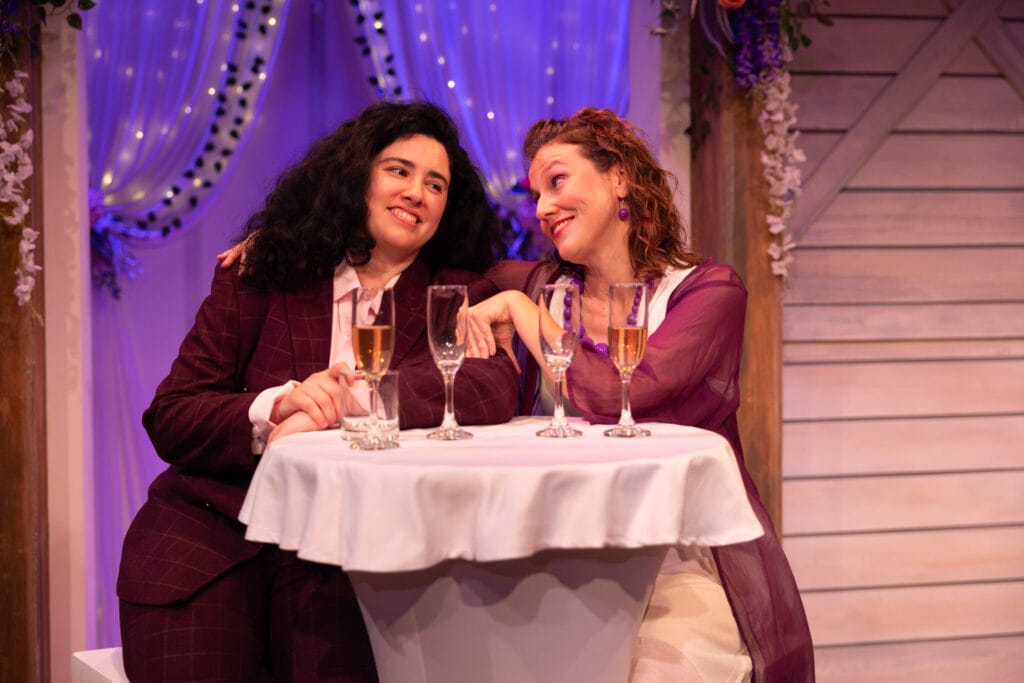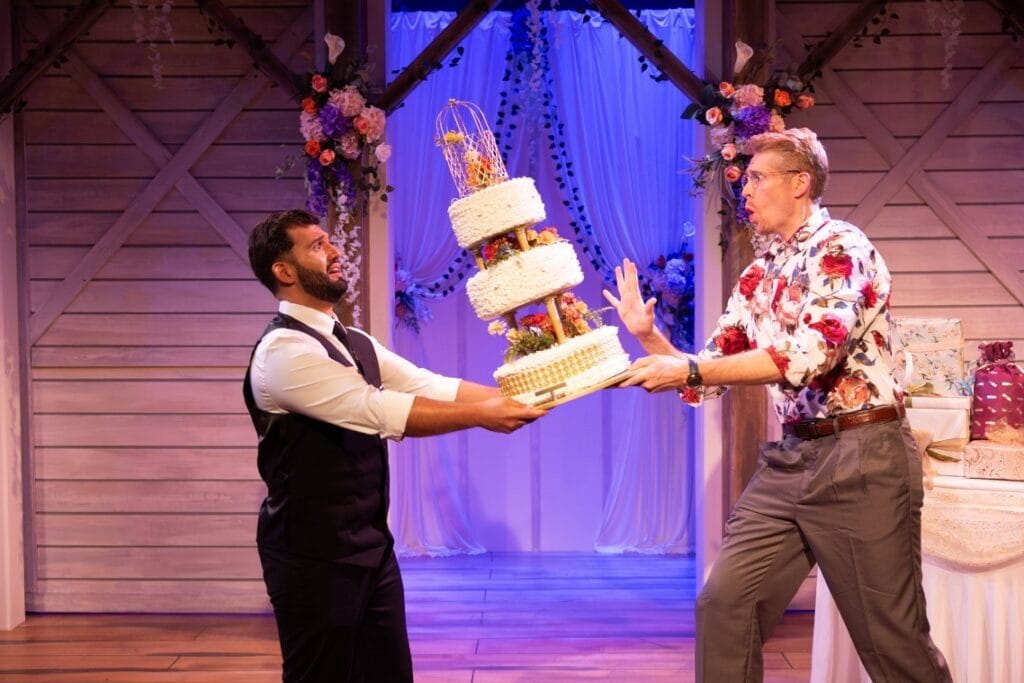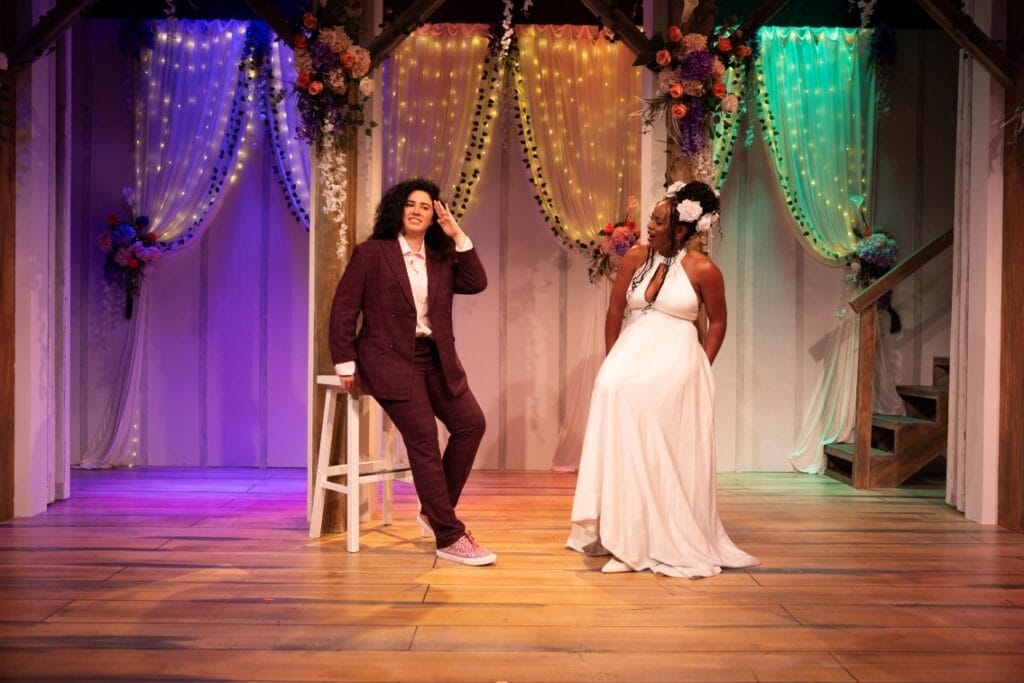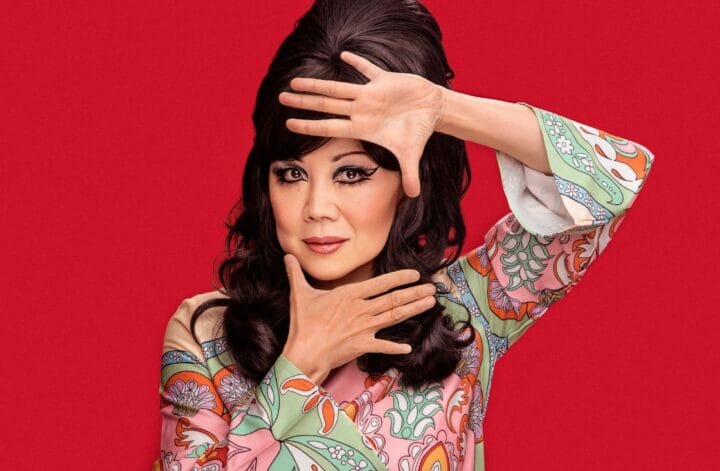We’ve come a long way since wedding vows always featured an officiant pronouncing the ominous words: “Should anyone present know of any reason that this couple should not be joined in holy matrimony, speak now or forever hold your peace.”
That’s the traditional quote from the marriage liturgy section of The Book of Common Prayer, first published by the Church of England in 1549. Updated variations, which nevertheless always end with “speak now or forever hold your peace,” are rarely used in real life nowadays, but continue to be a popular comedic motif of film and TV. And perhaps, now, plays as well. At least in substance, if not in the specific use of the phrase.
Bryna Turner’s AT THE WEDDING premiered Off-Broadway in 2022 to enthusiastic reviews by critics and audiences alike. (The New York Times proclaimed it “fresh and trenchant … and bitterly funny.”) Now Dixie Highway’s Island City Stage is closing out its highly acclaimed and edgy 13th season by inviting us to the play’s South Florida premiere where, as guests “At the Wedding,” we can share in all the humor and heartbreak … maybe identify with its rollercoaster ride of love, loss, and ultimate acceptance wrapped in a glimmer of hope for a brighter tomorrow.
The show’s finely attuned director (and Island City’s artistic director) Andy Rogow reflects: “One of the things I love about this play is that it truly connects to anyone who has had heartbreak in their life or watched an ‘ex’ marry someone else. Audiences will also recognize the guests at this wedding – the perfect bridesmaid, the inebriated mother-of-the-bride, the sibling who’d rather be somewhere else, and the romantic who wants to propose to his partner during the reception … It’s all great fun!”

Though not so much for central character Carlo (Hannah M. Benitez), the lovelorn lesbian who ignored her invitation, then makes a last-minute decision to crash her former girlfriend’s wedding to “horrors!” A MAN! She’s seated at the kids table, where she says things that make the children run off in tears. Then acts up and laments losing the love of her life – to us, and to various guests (including old friends she hadn’t seen in years) while endlessly guzzling drinks from server Victor’s (Steven Guez) tray before landing at the bar. Carlo’s entire experience of the festivities can be seen as “one huge objection” to the couple’s nuptials as her evening turns into a boozy minefield of heartbreak, regrets, and desperate altercations with the bride and various members of the wedding party.
Providing constant contrast to Carlo’s laments, is wild and goofy 1970s and ‘80s disco music – starting with “Celebration” and ending with “Last Dance … last chance for love” – all popular greats for dance-party fun! The play’s opening reception scene showcases an upbeat soundtrack followed by frequent pop-music-backed dance interruptions which keep even the heaviest revelations from getting us too down during what’s meant to be a joyous, life-affirming occasion. (Kudos to assistant director/choreographer Greg Schuh and sound designer David Hart. With appropriate, while still inventive costume design by W. Emil White.)
Eye-rolling, wildly expressive Timothy Mark Davis jerk-dances onto the stage as Eli, who’s involved with a member of the wedding party. He’s surrounded by lovely, slinky-gowned bridesmaid Hannah Hayley as Carly (who first accuses Carlo of malevolent intent, not unwarranted, but will later offer hugs and a shoulder to cry on), Elizabeth Price as Maria (romantically disillusioned and angry, divorced mother-of-the-bride), Sandy Stock as partnered but still-on-the-make Leigh, and Sheena O. Murray as “normality”-embracing bride, Eva.
Tray-bearing waiter Steven Guez, as Victor, also frequently adds high-kicking high jinks to the disco beats. Victor does fine passing out drinks until the end of the evening when, likely having imbibed one too many himself, Eli saves him from the near disaster of dropping the tall wedding cake.
But then there’s Carlo, who will eventually come up with four possible “crisis disturbances” that she serves up to the bride – just to keep things from getting this wedding too “heterosexually boring.” Not to mention, pleading with her ex-lover to ditch her dreary groom and run away with her instead.
We first meet Carlo when the dancing revelers take off to reveal a seated, unhappy young woman with big black hair, dressed in a dark suit and bedazzled pink sneakers. As Carlo, Hannah M. Benitez’s sharp-witted, poignant and Pitbull-pitched fatalistic diatribe against falling in love lies at the heart of At the Wedding’s story. Her soul-baring observations do most of the play’s heavy lifting; she also interacts, one-on-one, with all the characters.

In her first scene, Carlo addresses us, the audience, as “kids.” Or maybe we stand in for her kids’ table group that were part of “this mass migration of children crying.” She bluntly states: “One day you’ll fall in love … and that love will break your heart. You will eternally be cast out.” Concluding with: “I can say that the fall from heaven is the worst pain you’ll feel in your life. An agony so profound, I wouldn’t wish it on my worst enemies.”
Yes, Carlo is bitter and disillusioned. She nonetheless retains a concerned and caring heart. We see her openly friendly side when she meets naive H.S. English teacher Eli (Timothy Mark Davis) who reveals his “great idea” to propose to his girlfriend during the reception in front of all their friends and family. Carlo is horrified. She insists the bride and groom would hate him for eternity if he emotionally hijacks the spotlight on their special day. But she doesn’t dissuade him from proposing privately. It’s different with Maria (Elizabeth Price), who’s been unlucky in love as well and is happy, though surprised, to see her old friend Carlo at this wedding – “Finally someone interesting! You’ll be my date,” she announces. “Protect me from this hell…. Hell is other people. Never get married.”
There’s a new person in Carlo’s life who commiserates with her from a balcony perch overlooking the outdoor festivities. Sandi Stock plays bi-sexual Leigh, dressed in a lighter-colored – but still men’s-style – vest and trousers. She’s obviously attracted to Carlo. They engage in a way-out-there conversation about whether today’s killers would need to add cannibalism to turn the excitement up a notch from more humdrum murders (yeah, strange). Leigh also hides a personal connection that’s only revealed at the very end. Playwright Bryna Turner has not only gifted us with an extraordinarily multi-faceted and entertaining 75-minute (no intermission) wedding day experience, but she’s also added a few last-minute surprises to her acerbic portrayal of contemporary relationship variations – all equal opportunity heartache providers.




